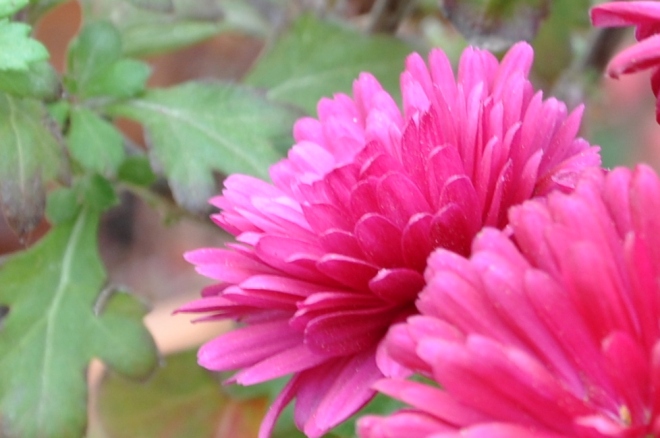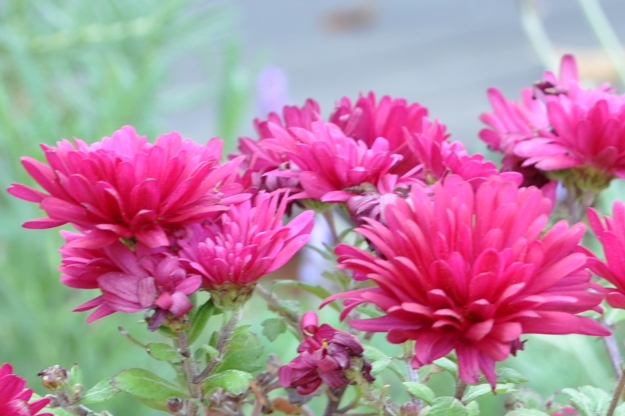Chrysanthemums will forever remind me of my own ‘Mum’ this time of year. She loved them. Mums were her go-to plant. She always brought one with her for the holidays. She liked sending mums as a gift, saying that flowering plants lasted longer than cut flowers. Mum and Dad owned two flower shops in Canada in the mid-fifties. Sadly for me, they sold the shops before I was born. I’m not sure how old I was before connecting the dots that ‘Mums’ and ‘Chrysanthemums’ were the same.
A year ago I bought this pink pretty pink Mum for the front deck. They usually last a season, dry out and then people toss them. I don’t give up on plants that quickly, so I cut this one back to the stems and continued to water it. It showed signs of life all summer, albeit short, green stems. It briefly sprang back to life this fall, with another display of color.
Non-Sequitur
On the subject of “Mums”, “Mums!” and “Mums,” I consulted Grammar Girl Mignon Fogarty on the proper use of quotes. Her explanation went a long way toward explaining my confusion. There is an American Usage and the Kings English usage. Since I started my education in Canada, then moved to US schools, it explains my confusion. I insert quotes with trepidation, and will restructure a sentence to avoid ending with a quote so that I don’t have to worry about incorrect usage.
Whew…I’m so glad I got that off my chest.
Here’s what Grammar Girl has to say:
When combining exclamation points and question marks with quotation marks, Americans follow the same logical system as the British. Where you place the other marks relative to the quotation mark depends on the context of the quotation.
If the whole sentence, including the quotation, is a question or an exclamation, then the question mark or exclamation point goes outside the closing quotation mark; but if only the part inside the quotation marks is a question or exclamation, then the question mark or exclamation point goes inside the closing quotation mark.
Quotation Marks with Semicolons and Colons
With semicolons, colons, asterisks, and dashes, we get back to a simple rule. They always go outside the closing quotation mark.
Summary
In American English, periods and commas always go inside the closing quotation mark; semicolons, colons, asterisks, and dashes always go outside the closing quotation mark; and question marks and exclamation points require that you analyze the sentence and make a decision based on context.
Hopefully, now that I’ve read this, copied it, edited it for brevity, the concept will stick. If not, as my grammar friend Francie likes to say, “so sue me!”
Organized at Heart
I’m posting a series of organizing around the holidays blogs this week on my blog Organized at Heart. If the subject interests you, please go take a peak.


